HERE’S WHY THEY CALL IT MEDICAL CITY
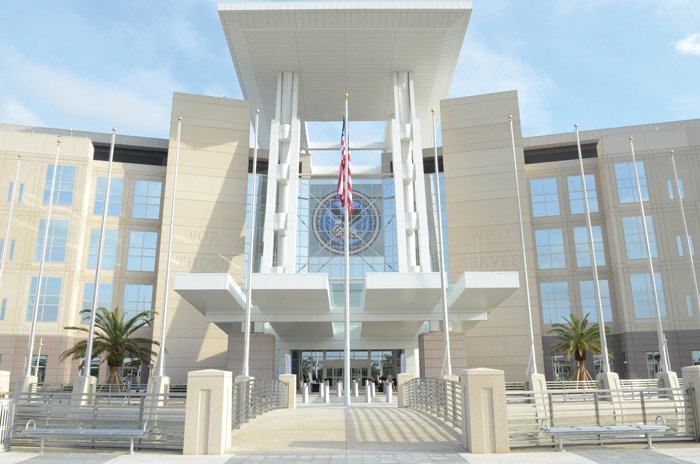
Orlando VA Medical Center at Lake Nona
This 1.2-million-square-foot Veterans Administration hospital and clinic was dedicated in May 2015 and continues to open in stages. The facility, which cost at least $620 million, includes an expanded veterans clinic, a diagnostic and testing center, a 120-bed Community Living Center, a 60-bed Domiciliary and an urgent-care facility.
The medical center is also home to the Central Florida Veterans Memorial Park, a $3 million memorial built with donations. The campus will employ approximately 3,000 healthcare providers and support staff, and is expected to serve more than 125,000 veterans in Central Florida.
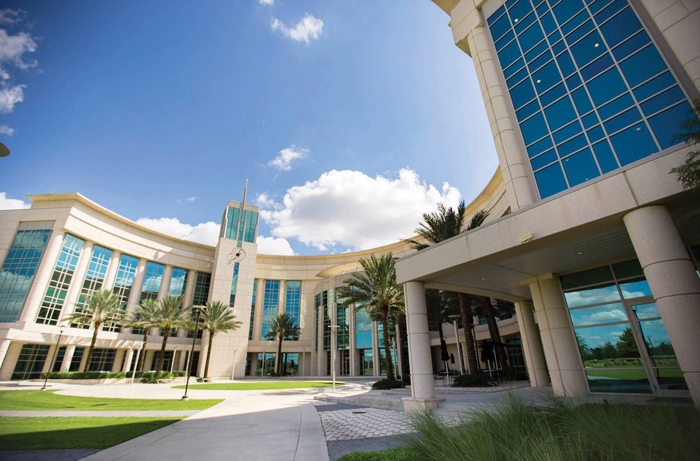
University of Central Florida College of Medicine
UCF’s $166 million Health Sciences Campus, which opened in 2010, includes a 170,000-square-foot medical education facility and the 198,000-square-foot Burnett Biomedical Sciences building.
In August, when it starts its ninth class, the M.D. program will be at full enrollment — 480 students. In addition, the college includes almost 3,000 undergraduates and graduate students in the biomedical sciences, including biotechnology, medical laboratory sciences and molecular biology.
In 2015, the medical school also opened its second office of UCF Health, its physician practice, at Lake Nona. All physicians are College of Medicine faculty members.
Earlier this year, UCF received state approval for an emerging teaching hospital at Lake Nona. The UCF Lake Nona Medical Center is being planned for 25 acres next to the medical school, and is estimated to open in 2020. The $175 million project is being built in partnership with the Hospital Corporation of America (HCA).
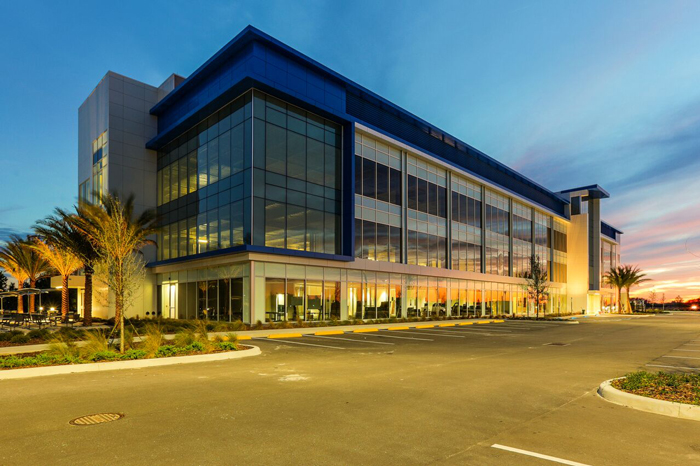
The GuideWell Innovation Center
The GuideWell Innovation CoRE (Collaborative Resource Ecosystem) is part of the 92,000-square-foot GuideWell UST Global Innovation Center. Its purpose: to connect entrepreneurs, research and development experts, and healthcare leaders with ideas, funding and resources.
“We’ll be working with early-stage companies, and helping incubate those companies while they’re developing new technologies and solutions for healthcare,” says Pat Geraghty, Guidewell’s chairman and CEO.
The complex offers a variety of spaces designed to enhance interaction, including a 250-seat theater in the round, co-working space for start-ups and entrepreneurs, a “start-up garage” featuring the latest 3D printing technology, and industrial engineering expertise from Edison Nation Medical.
There’s also a living lab for testing new products and technology as well as an audio-visual production studio, an executive board room and a screening room. Recent events have focused on innovations in cancer and mental health care.
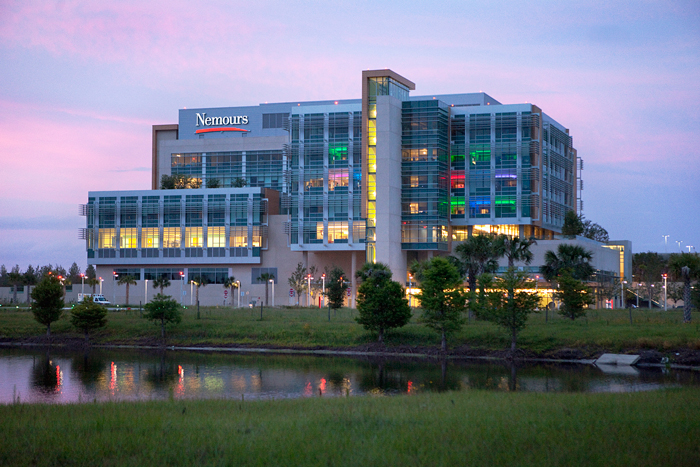
Nemours Children’s Hospital
This 100-bed, 630,000-square-foot hospital was built at a cost of $400 million by the internationally recognized Nemours Children’s Health System and opened in 2012. In Florida, Nemours also owns and operates major pediatric specialty-care centers in Jacksonville and Pensacola, 14 pediatric primary-care centers and six pediatric urgent-care centers.
Last August, a Ronald McDonald House opened next to the hospital with 15 bedrooms and other accommodations for families that have sick children being treated at Nemours.
More recently, the hospital opened a new Publix pharmacy for patients, their families and employees.
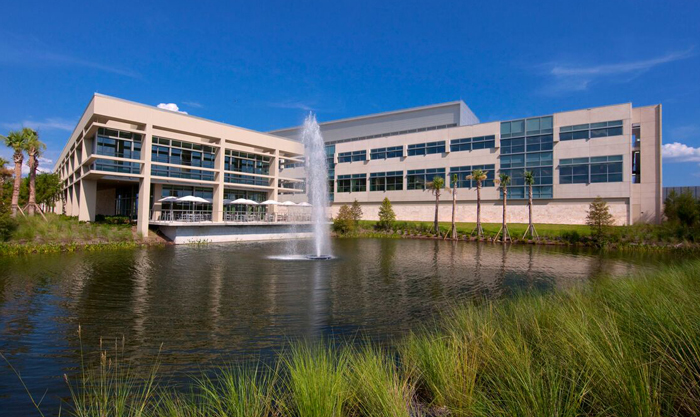
Sanford Burnham Prebys Medical Discovery Institute
Previously known as the Sanford-Burnham Medical Research Institute, the $85 million, 175,000-square-foot facility opened in 2009 as the first Medical City cornerstone.
It encompasses the Diabetes and Obesity Research Center, where scientists focus on metabolic diseases such as diabetes and obesity as well as on Alzheimer’s disease and cancer. The institute’s East Coast campus — the main campus is in La Jolla, California — is also home to the Conrad Prebys Center for Chemical Genomics, where researchers work to identify and develop new medicines.
Last summer, the institute announced that it was no longer economically feasible to operate a Florida facility, and sought to transfer its Lake Nona assets and operations to the University of Florida and its adjacent academic center.
However, that effort was unsuccessful. So the institute is still looking for a sustainable solution to ensure that biomedical research continues at the site, according to a spokesperson. Although discussions were underway with Florida Hospital at presstime, no agreement had been reached as of early July.
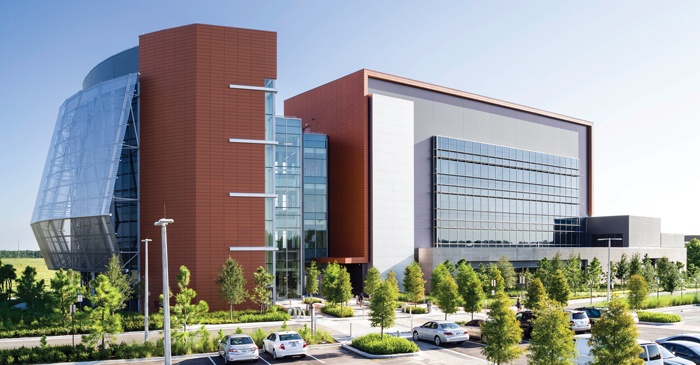
University of Florida Research and Academic Center
The state’s flagship university has built a $53 million, 115,000-square-foot facility that houses a clinical research unit of its Institute on Aging — a program that studies, among other things, drug interactions in the elderly — as well as the Orlando campus of the UF College of Pharmacy.
The emphasis is on clinical research related to diabetes and cardiovascular disease as well as obesity. Through the UF Institute of Therapeutic Innovation, also at Lake Nona, researchers are conducting trials to help develop new anti-infectious disease drugs.
